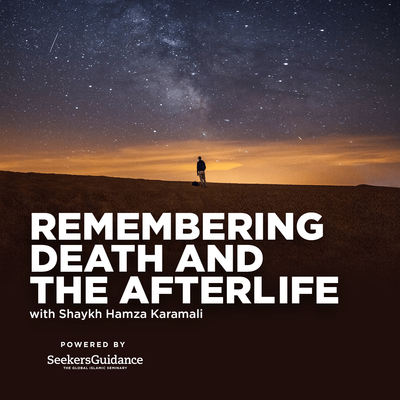
Remembering Death and the Afterlife with Shaykh Hamza Karamali
Engels
Tijdelijke aanbieding
2 maanden voor € 1
Daarna € 9,99 / maandElk moment opzegbaar.
- 20 uur luisterboeken / maand
- Podcasts die je alleen op Podimo hoort
- Gratis podcasts
Over Remembering Death and the Afterlife with Shaykh Hamza Karamali
Allah Most High says in the Qur’an, “Every soul will, without doubt, fully experience death.” (3:185, 21:35, 29:57) We will all die. You will die, I will die, and everyone that we all know will die. But what exactly does it mean to die? What is death? In this series, Shaykh Hamza Karamali will relate and explain many other Qur’anic verses and prophetic hadiths that describe what happens after we die.
Alle afleveringen
8 afleveringen06- Don’t Long For Death- Shaykh Hamza Karamali
The Holy Prophet (peace be upon him) taught us not to long for death. But when calamities strike, they can blow the wind out of us, making us forget the purpose of our existence, and, sometimes, making us long for death so that they might end. Hamza unpacks the words of the Holy Prophet (peace be upon him) to explain why this is a mistake and how we should correct it.
06- Don’t Long For Death- Shaykh Hamza Karamali
The Holy Prophet (peace be upon him) taught us not to long for death. But when calamities strike, they can blow the wind out of us, making us forget the purpose of our existence, and, sometimes, making us long for death so that they might end. Hamza unpacks the words of the Holy Prophet (peace be upon him) to explain why this is a mistake and how we should correct it.
What Should You Do When You Are About To Die?- Shaykh Hamza Karamali
We will all, one day, be on the verge of our deaths, staring at the end of our lives, the end of our choices, the end of our actions. We will only take with us what we did before that time. There will be no going back, and there will be nothing more left to do. Or will there, in fact, be something left for us to do? Shaykh Hamza Karamali explains.
What Should You Do When You Are About To Die?- Shaykh Hamza Karamali
We will all, one day, be on the verge of our deaths, staring at the end of our lives, the end of our choices, the end of our actions. We will only take with us what we did before that time. There will be no going back, and there will be nothing more left to do. Or will there, in fact, be something left for us to do? Shaykh Hamza Karamali explains.
04 – How Should We Live?
How Should We Live? How should we live? Allah Most High tells us, saying, “O you who have believed”—ya ayyuha alladheena aamanu—“fear Allah continuously”—ittaqu allah haqqa tuqatihi—“and never, ever die unless you are in a state of wholehearted submission.”—wa la tamutunna illa wa antum muslimun. (Qur’an, 3:102) This verse tells us that we should live with continuous fear of Allah Most High, the overwhelmingly powerful creator and master of every atom in the universe. Now, if you don’t know who Allah is, living in continuous fear of Him will sound miserable. You might think that living in continuous fear of Allah Most High is like living in continuous fear of some powerful and ruthless dictator (may Allah Most High preserve our freedoms and protect us from all kinds of subjugation). Living in continuous fear of a powerful and ruthless dictator is, indeed, miserable. When you sleep, you fear assassination; when you eat, you fear poisoning; when you leave your hiding-place, you fear imprisonment; when you use your cell-phone, you fear being tapped; when you talk to an acquaintance, you fear being betrayed—your continuous fear prevents you from being able to enjoy anything. You live in misery. But living in continuous fear of Allah Most High is not like that because Allah Most High is not a powerful and ruthless dictator. Clear your heart. Hit “delete” on all thoughts of powerful and ruthless dictators. And listen carefully to understand who Allah Most High is and what He means when He tells us to live in continuous fear of Him. The Arabic word for the fear of Allah is taqwa. What this word actually means is not “feeling scared of something”; what it actually means is, “protecting yourself”. The opening verse of this episode uses the Arabic expression, ittaqu allah. This is frequently translated as, “fear Allah”, but what it really means is, “protect yourselves from Allah”. Now, someone might protect themselves from another human being by lifting weights, training in martial arts, hiring bodyguards, or seeking refuge in a safer country. But that is not how they would protect themselves from Allah Most High. How could they?—no matter how strong their muscles, no matter how skillful their martial arts, no matter how numerous their bodyguards, no matter which country they might flee to, nothing in the universe can protect them from Allah Most High. How could it?—He is the one who created it, and were it not for Him, it wouldn’t even exist. So if nothing in the universe can protect us from Allah, then what does He mean when He commands us to protect ourselves from Him? What or who is there that can possibly protect us from Him?—No one but Allah Most High Himself. The Holy Prophet (Allah bless him and give him peace) used to supplicate, “O Allah! I seek refuge in Your pleasure from Your anger, in well-being that You give from the punishment that You send, and I seek refuge in You from You.” (Muslim: 486) When someone wants to protect themselves from a ruthless dictator, they run away from him. When someone wants to protect themselves from Allah, they run to Him. They run away from the ruthless dictator because he is out to get them. They run to Allah because He wants to forgive them. Fear of a ruthless dictator drives one to hate him. Fear of Allah drives one to love Him. Fear of a ruthless dictator is misery. Fear of Allah is joy. Let’s return to the opening verse of this episode. Allah Most High says, “O you who have believed, fear Allah continuously, and never, ever die unless you are in a state of wholehearted submission.” (Qur’an, 3:102) This verse tells us how we should live—we should live in continuous fear of Allah Most High. What does that mean? It means that, out of fear of His anger, we should take the means to His pleasure; out of fear...
Kies je abonnement
Tijdelijke aanbieding
Premium
20 uur aan luisterboeken
Podcasts die je alleen op Podimo hoort
Gratis podcasts
Elk moment opzegbaar
2 maanden voor € 1
Daarna € 9,99 / maand
Premium Plus
Onbeperkt luisterboeken
Podcasts die je alleen op Podimo hoort
Gratis podcasts
Elk moment opzegbaar
Probeer 30 dagen gratis
Daarna € 11,99 / maand
2 maanden voor € 1. Daarna € 9,99 / maand. Elk moment opzegbaar.































